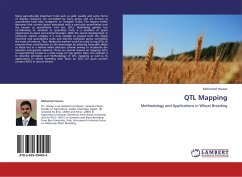Many agriculturally important traits such as yield, quality and some forms of disease resistance are controlled by many genes and are known as quantitative traits (also polygenic or complex traits). The regions within genomes that contain genes associated with a particular quantitative trait are known as quantitative trait loci, QTLs. Identifying genetic loci contributing to variation in quantities traits is a problem of great importance to plant and animal breeders. With the recent development in molecular marker analysis, it is now feasible to analyze both the simply inherited and quantitative traits and identify individual genes controlling the traits of interest. Thus, Molecular markers could be used to tag QTLs to evaluate their contributions to the phenotype by selecting favorable alleles at these loci in a marker-aided selection scheme aiming to accelerate the selection and genetic advance. There are several reviews on mapping QTLs in experimental crosses in a wide range of crop plants. Here, the attempt is to describe principles and methodology of QTL mapping as well as its applications in wheat breeding with focus on QTLs for grain protein content (GPC) in durum wheat.

